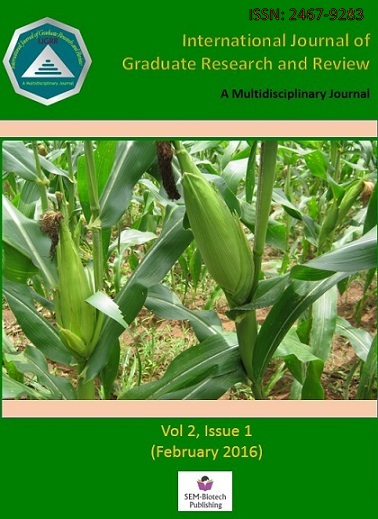




Role of Cooperatives in Poverty Alleviation of Rural Farmers in Nepal: Empirical Evidences
Manoj Sharma*
Department of Agriculture Economics and Agribusiness Management, Agriculture and Forestry University, Rampur, Chitwan, Nepal
Manoj Sharma*
Department of Agriculture Economics and Agribusiness Management, Agriculture and Forestry University, Rampur, Chitwan, Nepal
Abstract
Cooperatives are community-based autonomous organization which is member-owned, managed, and controlled. The cooperative model of production and marketing at the grassroots (i.e., community) of Nepal is seen as an instrumental strategy towards agricultural growth and commercialization. The persisted cooperative movement of Nepal up to 1991 and breakthrough as Cooperative Act 1992 has helped to alleviate poverty through empowering the poor community at institutional, economic and social level through employment generation, increasing incomes, improving health, education and sanitation, women’s empowerment, better physical infrastructure, and also due to food security. Despite of these impressive outcomes of cooperatives, there are still a lot of lacunae to be addressed at different aspects like managerial, policies, human resource management, and R&D. Thus, the attitudes of government and the generality of the people must be changed positively towards cooperative development, since it will be too difficult to achieve meaningful balanced development without involving abundant small farmers, for whom cooperative approach is highly contributing to capture economies of scale.
Keywords: Commercialization; Cooperatives; Farming; Poverty trap; Rural farmers
Cooperatives are community-based autonomous organization which is member-owned, managed, and controlled. The cooperative model of production and marketing at the grassroots (i.e., community) of Nepal is seen as an instrumental strategy towards agricultural growth and commercialization. The persisted cooperative movement of Nepal up to 1991 and breakthrough as Cooperative Act 1992 has helped to alleviate poverty through empowering the poor community at institutional, economic and social level through employment generation, increasing incomes, improving health, education and sanitation, women’s empowerment, better physical infrastructure, and also due to food security. Despite of these impressive outcomes of cooperatives, there are still a lot of lacunae to be addressed at different aspects like managerial, policies, human resource management, and R&D. Thus, the attitudes of government and the generality of the people must be changed positively towards cooperative development, since it will be too difficult to achieve meaningful balanced development without involving abundant small farmers, for whom cooperative approach is highly contributing to capture economies of scale.
Keywords: Commercialization; Cooperatives; Farming; Poverty trap; Rural farmers
Int. J. Grad. Res. Rev. Vol-6, Issue-1: 5-10
International Journal of Graduate Research and Review is licensed under a Creative Commons Attribution Non-Commercial 4.0 International
(https://creativecommons.org/licenses/by-nc/4.0).
(https://creativecommons.org/licenses/by-nc/4.0).





